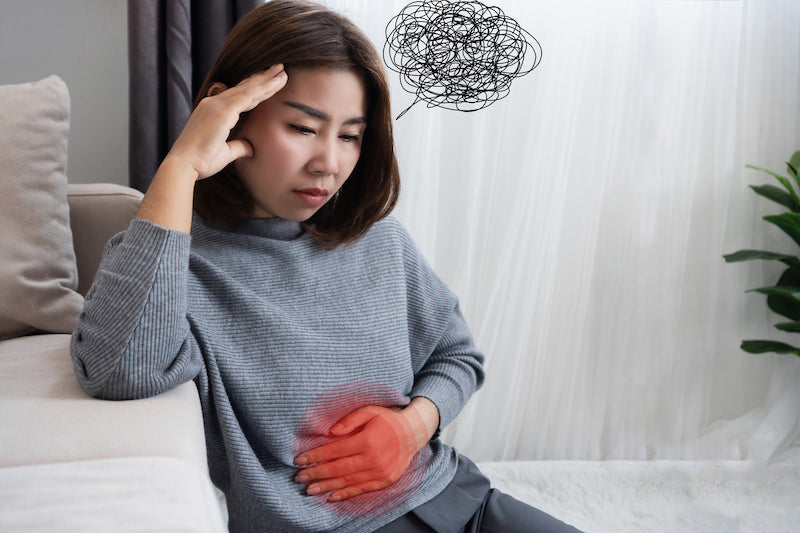It's likely—at some point in your life—you've heard someone say they've had "gut-wrenching experience" or "a pit in my stomach.
Turns out, our gut and our feelings are closely connected...and not just by the funny little things we say.
In fact, the gut and the brain communicate constantly. So much that scientists even refer to the gut as the “second brain.”
And researchers have just uncovered a shocking truth…
Difficult and traumatic experiences—especially early in life—cause lasting changes to the gut microbiome (the trillions of bacteria in the gut). And those changes affect everything from the strength of our immune systems to the way we react to stressful situations.[1]
What’s more, the changes go both ways. What happens to your gut can spark lasting changes in the brain, which can make you more vulnerable to mental health issues including Post Traumatic Stress Disorder (PTSD), anxiety, depression, and more.
Here's the good news: Regularly adding beneficial spore probiotics to your microbiome can actually help improve your physical and mental health!
The Signs of Trauma in Your Gut
If you’ve experienced childhood trauma, your gut microbiome shows it. People who’ve suffered early trauma (whether it’s a car accident, the death of someone close, child abuse, or another tragedy) have notably different microbiomes than people who haven’t experienced trauma.
Researchers have uncovered some key microbiome differences.[2] Trauma sufferers tend to have:
- Less diversity (fewer different types of beneficial bacteria in the gut)
- Higher proportions of bad bacteria (pathogens that cause many health issues)
- Smaller populations of important keystone bacteria, such as actinobacteria[3], that are crucial for healthy microbiome balance
Those differences can lead to weaker immune systems and long-term digestive troubles.

Here’s the kicker: The microbiome will actually stay in that “trauma state” even when circumstances change. It does not bounce back to it's pre-trauma state (at least not on it's own).
So how can you help your trauma gut get back to baseline? With the support of beneficial spore probiotics! They can make a world of difference in both your physical and mental health.
A Two-Way Street Between Gut and Brain
There’s a special highway in your body called the gut-brain axis. Your gut and brain talk to each other constantly. That conversation takes place by way of the vagus nerve, which connects the two.
Both your brain and your gut host special cells called neurons. Neurons send electrical messages throughout your body telling other cells and organs how to function, and what to feel. Most neurons—around 86 billion—are found in your brain, but your gut also houses about 500 million of these cells.
Neurons in your brain “talk” to the ones in your gut, so when you’re feeling upset, you could easily end up with GI (gastrointestinal) issues like stomach aches, diarrhea, or nausea. The opposite also holds true: Constant GI distress can ruin your mood and make it harder to cope with stress and difficult emotions.
Probiotics and "Feel Good” Brain Chemicals
When your microbiome is out of balance—a condition called dysbiosis—the bad bacteria outnumber the good. And since the good bacteria (a.k.a. probiotics) in your gut produce important brain chemicals called neurotransmitters, the dysbiosis can make mental health issues even worse.
In fact, the beneficial bacteria in your gut produce about 90% of your body’s serotonin supply.[4] Serotonin—also called the "happy hormone"—greatly affects your mood and influences your:
- Sleep cycle
- Libido
- Appetite
- Pain reactions
In addition to serotonin, the naturally-occurring probiotics in your microbiome produce a neurotransmitter called GABA (gamma-aminobutyric acid), which helps you deal with fear and anxiety. Without enough GABA, feelings of fear and anxiety can spiral out of control.
In order to produce plenty of serotonin and GABA, your microbiome needs to be well-balanced (with more probiotics and fewer pathogens) and very diverse. And as scientists now know, early trauma can interfere with that.
In fact, a study[5] conducted on the strains used in Just Thrive showed that taking 1 capsule a day for 30 days reduced ghrelin levels (the hunger hormone), illustrating that these strains assist in the communication between the gut and the brain.
Balancing your gut with spore probiotics is the first step toward ramping up production of those “feel-good” brain chemicals. And as an added bonus, spore probiotics also tame GI issues…and change the messages your gut is sending to your brain.[6]
Post-Trauma Support: Spore Probiotics
Traumatic experiences are unique and deeply personal—and so is the road to recovery. One factor that may make that road a little easier to travel is a healthy microbiome.
Supplementing with Just Thrive spore probiotics offers the most direct path to a well-balanced gut. Just Thrive Probiotic includes four clinically proven strains of spore probiotics known to support a healthy, diverse microbiome.
High-Level Support: Just Thrive PREbiotic
And when your gut has been out of balance for a long time—often the case when there’s been early trauma—your probiotic good guys can benefit from an extra hand.
That's where prebiotics come in! Prebiotics serve as food, fuel, and fertilizer for beneficial bacteria. But not all prebiotics are created equal. Some feed the both the good AND bad bacteria. That's why we created Just Thrive PREbiotic. Just Thrive PREbiotic selectively nourishes ONLY beneficial bacteria, including vital keystone strains.
>> Support your "second brain" with Just Thrive Probiotic and PREbiotic.
Unsure about trying Just Thrive Probiotic or PREbiotic? We can help!
EVERY Just Thrive purchase is covered by our Bottom of the Bottle, 100% money back guarantee.
That means you can try Just Thrive Probiotic and PREbiotic to see how well they work for you… and we’re confident that you’ll notice positive results.
But if for any reason you don’t feel a difference, you can ask for a full product refund at any time. Even if it’s been 3 months or 3 years. Even if the bottle is empty! You’ll get your money back any time, no matter what.
Sources
- Moloney RD, Desbonnet L, Clarke G, Dinan TG, Cryan JF. The microbiome: stress, health and disease. Mamm Genome. 2014;25(1-2):49-74. doi:10.1007/s00335-013-9488-5
- Hemmings SMJ, Malan-Müller S, van den Heuvel LL, et al. The Microbiome in Posttraumatic Stress Disorder and Trauma-Exposed Controls: An Exploratory Study. Psychosom Med. 2017;79(8):936-946. doi:10.1097/PSY.0000000000000512
- Binda C, Lopetuso LR, Rizzatti G, Gibiino G, Cennamo V, Gasbarrini A. Actinobacteria: A relevant minority for the maintenance of gut homeostasis. Dig Liver Dis. 2018;50(5):421-428. doi:10.1016/j.dld.2018.02.012
- Yano JM, Yu K, Donaldson GP, et al. Indigenous bacteria from the gut microbiota regulate host serotonin biosynthesis [published correction appears in Cell. 2015 Sep 24;163:258]. Cell. 2015;161(2):264-276. doi:10.1016/j.cell.2015.02.047
- McFarlin BK, Henning AL, Bowman EM, Gary MA, Carbajal KM. Oral spore-based probiotic supplementation was associated with reduced incidence of post-prandial dietary endotoxin, triglycerides, and disease risk biomarkers. World J Gastrointest Pathophysiol. 2017;8(3):117-126. doi:10.4291/wjgp.v8.i3.117
- Karl JP, Hatch AM, Arcidiacono SM, et al. Effects of Psychological, Environmental and Physical Stressors on the Gut Microbiota. Front Microbiol. 2018;9:2013. Published 2018 Sep 11. doi:10.3389/fmicb.2018.02013










